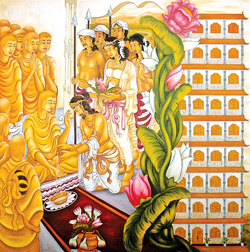Dialogues between King Kosala and the Buddha
Prof. Sunanda Mahendra
Some encounters between King Pasenadi Kosala and the Buddha are
recorded in the Kosala Samyutta of Samyutta Nikaya. These dialogues
retell the nature of the inner bliss one can achieve.
 |
|
The Buddha welcomed by King Kosala
Picture by Saman Sri Wedage |
Underestimating the infant
In the very first Dahara Sutta King Kosala tells the Buddha that some
of the contemporary teachers such as Nigantha Nathaputta, Pakuda
Kachchayana, Makkhali Gosala, Sannjaya Bellaththiputta and Ajitha
Kesakambla have uttered that the Buddha is infant in age as well as
doctrine. They have declared the term dahara or 'infant' to denote
external factors like one's age and teacherhood.
The Buddha was listening to King Kosala when he raised the term
dahara which is ladaru in Sinhala. He exemplified the inner meanings of
the term as applied in the worldly sense hinting at a deeper layer of
inner meanings. The Buddha says that there are four types about which
the term dahara cannot be used. What are they?
In the first instance an infant like Kshatriya Prince cannot be
humiliated or denounced from the very physical appearance as an infant.
Why? The prince will grow up to become matured in both age and
experience to the point that he will no longer be infant-like.
Secondly take the case of fire, said the Buddha, as the King Kosala
was listening eagerly. The fire in the sprinkle or seminal form cannot
be humiliated or denounced as 'infant-like' for it will gradually extend
the power of being a greater and intensified fire which one could not
fathom if a disaster is caused. As such the infant though physically
infantine, will spread in a gradual process. So insult not the fire by
its primary stage.
Thirdly comes the case of a serpent which looks like an infant. The
infant like serpent gradually grows into a giant creative who could even
bring disaster with its venom. As such insult no the serpent in an
infantile process. Humiliate not the serpent in its infantile process.
Then comes the case of a Samana or a novice monk who should not be
looked at from any negative outlook. A novice will gradually grow up to
be an elderly monk who would have achieved some power both in physical
plane as well as spiritual plane in his search as an inner development.
In this process of growing up the mere physical appearance should not be
counted as derogatory signs to insult or humiliate.
Heavy meals
Once again at an odd time of the day a sultry midday, King Kosala
appeared before the Buddha. The Buddha saw that the King showed a lazy
yawning face.
"I feel overeaten. My belly is full. I feel lazy. I am unfit both
physically and mentally." The Buddha knew the plight of the king who had
partaken of a heavy meal greedily. Then the Buddha explained to the King
the miseries caused by overeating in the following manner.
"Be moderate in your foot habits. The moderate quality of a person
gives way to the elimination of various physical and mental ailments.
The moderate eating habit allows the proper digestion and enables the
longevity."
King Kosala then had his servant Sudasana besides him.
"Sudassana I will pay you a salary. Whenever I sit at the royal table
partake of meal, you should remind me those words of the Buddha. By and
by King Kosala was relieved of a long lasting habit. He gave up
overeating and took up moderate eating. This incident is related in
Donapadaka Sutta of Kosala Samyutta.
Who do you love most?
One resourceful dialogue that ensued between King Kosala and the
Buddha appears in Mallika Sutta on love.
"Who do you love most in your life?" King asked his queen once.
"Myself." Queen was relaxed in her response. But it was not what the
king expected. The queen shot the question back, and the king responded
swiftly: "I love myself too."
King brought up this situation later with the Buddha. The Buddha
clarified the situation in the shortest possible manner.
"Even if you traverse all four directions of the earth, you may not
find a single person who does not love another person other than himself
or herself. All beings love themselves."
Once King Kosala paid a visit to the Buddha together with his deputy
kings. They were known as Pancha Raja. They had a debate on favourite
sense. One said the highest sensory perception comes from rupa (image).
Another said it is shabda (sound). Another said it is gandha (smell).
Another said it is rasa (taste). Another said it is passa (contact).
That is when they decided they should ask the Buddha.
"King, the preference is individualistic and depends on the person
concerned. Some prefer rupa over shabda, and some others prefer gandha
over others. It is certainly the reference that matters. It is the
manapapariyantam in you that drives your desire."
At this juncture there was an upasaka named Chandanamgulika, who
stood in a corner of the congregation hall, who nodded his head, and
said: "Oh great Master I verily understood what you said. The five kings
looked at the upasaka. The Buddha declared in approval. "I knew it
Upasaka. You verily understood what I said."
The five kings removed their shawls round their necks and garlanded
Upasaka Chandanangalika. This event is stated in Pancharaja Sutta.
In this manner the dialogues in the events that took place between
King Kosala at the Buddha are penetrative insights to day to day life.
|



